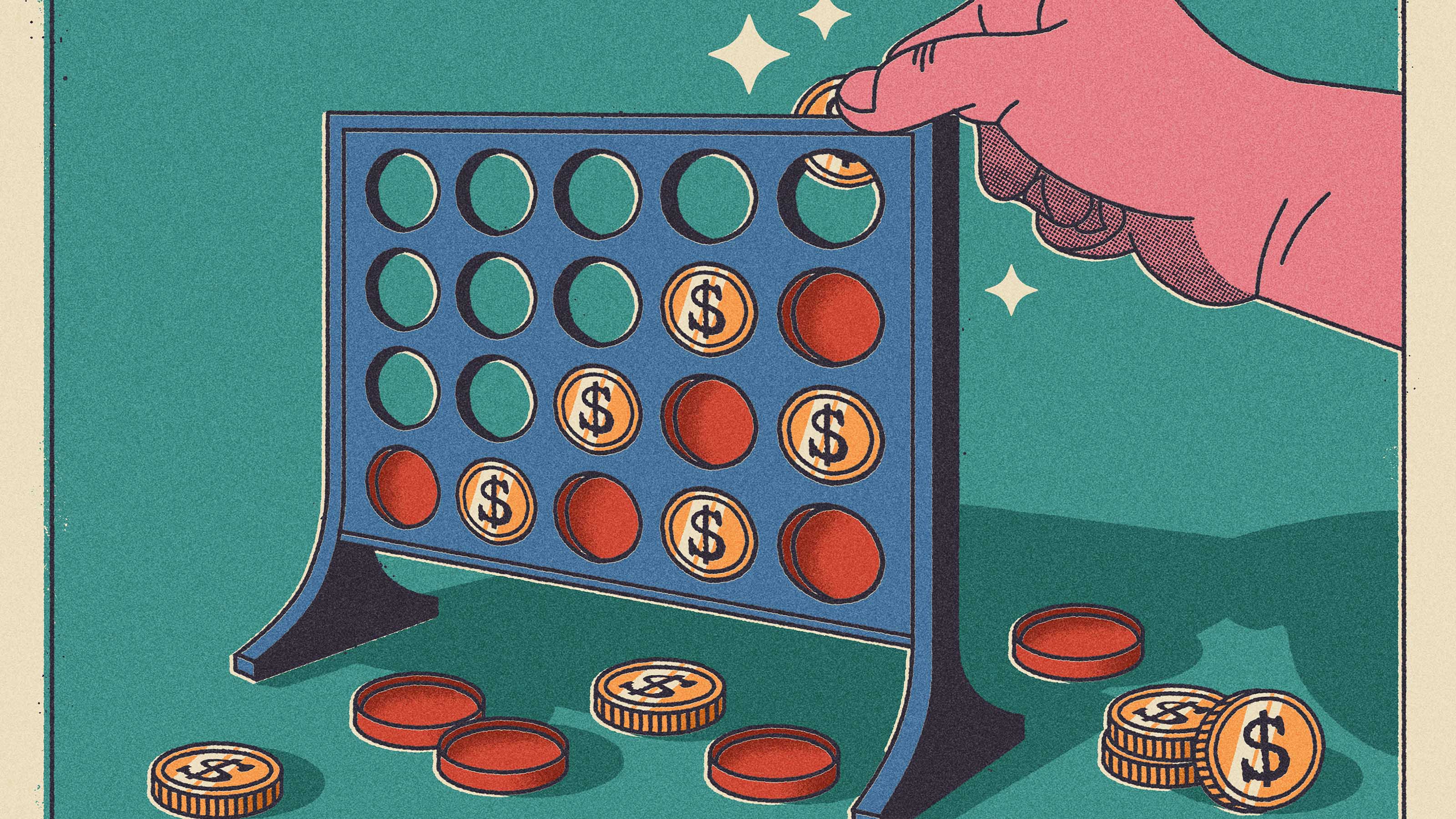The Power of Reinvested Dividends
Seagate's regular (and rising) payout provides this investor some comfort in an ever-changing market.

Profit and prosper with the best of Kiplinger's advice on investing, taxes, retirement, personal finance and much more. Delivered daily. Enter your email in the box and click Sign Me Up.
You are now subscribed
Your newsletter sign-up was successful
Want to add more newsletters?

Delivered daily
Kiplinger Today
Profit and prosper with the best of Kiplinger's advice on investing, taxes, retirement, personal finance and much more delivered daily. Smart money moves start here.

Sent five days a week
Kiplinger A Step Ahead
Get practical help to make better financial decisions in your everyday life, from spending to savings on top deals.

Delivered daily
Kiplinger Closing Bell
Get today's biggest financial and investing headlines delivered to your inbox every day the U.S. stock market is open.

Sent twice a week
Kiplinger Adviser Intel
Financial pros across the country share best practices and fresh tactics to preserve and grow your wealth.

Delivered weekly
Kiplinger Tax Tips
Trim your federal and state tax bills with practical tax-planning and tax-cutting strategies.

Sent twice a week
Kiplinger Retirement Tips
Your twice-a-week guide to planning and enjoying a financially secure and richly rewarding retirement

Sent bimonthly.
Kiplinger Adviser Angle
Insights for advisers, wealth managers and other financial professionals.

Sent twice a week
Kiplinger Investing Weekly
Your twice-a-week roundup of promising stocks, funds, companies and industries you should consider, ones you should avoid, and why.

Sent weekly for six weeks
Kiplinger Invest for Retirement
Your step-by-step six-part series on how to invest for retirement, from devising a successful strategy to exactly which investments to choose.
There’s something a little magical about the impact of dividends—particularly reinvested dividends—on the value of a portfolio. Dividends can keep the value of your investments rising even when market performance sours.
The dividend effect provides me comfort as I look over an investment landscape that has changed dramatically since I started the Practical Investing portfolio three and a half years ago. At the time, nearly every stock I examined seemed cheap. Now, it’s much harder to find a bargain. That doesn’t mean stocks won’t keep rising. But the market’s long, almost uninterrupted advance increasingly makes me appreciate the one nearly sure thing in an otherwise uncertain environment: the power of dividends.
In 2014, my portfolio received $10,069 in dividends and other dividend-like payouts. That works out to a 3.3% yield on the year-end balance of $304,210. But my yield is really higher. That’s because, while I have been reinvesting dividends, I haven’t added a dollar to the account since I bought nearly $190,000 worth of stocks in 2011 and 2012. If I based the calculation of the yield on my original stake, it’s a far more generous 5.3%.
From just $107.88 $24.99 for Kiplinger Personal Finance
Become a smarter, better informed investor. Subscribe from just $107.88 $24.99, plus get up to 4 Special Issues

Sign up for Kiplinger’s Free Newsletters
Profit and prosper with the best of expert advice on investing, taxes, retirement, personal finance and more - straight to your e-mail.
Profit and prosper with the best of expert advice - straight to your e-mail.
The greater the dividend yield, the less I need to rely on stock price appreciation to deliver a reasonable return. Of course, when stock prices rise, dividend yields normally fall. But some of the cash-rich companies I hold have hiked their dividends at such a brisk pace that, despite rapid appreciation in share prices, yields have actually risen.
Consider Seagate Technology (symbol STX). I bought 435 shares in June 2012 for $23.11 a share. Because I’ve been reinvesting dividends (which Seagate has hiked four times since I bought the stock), I now own 482 shares. With the stock at $52 as of March 31, my stake is worth $25,078—a return of 149% on my initial investment. At the current price, the stock yields a healthy 4.2%. But the yield based on my initial purchase price is 9.3%. That will keep me comfortable with the stock even if it just treads water for a few years.
However, I expect shares of Seagate, which makes data-storage devices for personal computers, to do more than that. One reason is that the stock is one of the market’s great remaining bargains. It has been sliding since hitting $69 in December, partly because of perceptions that PC sales are weakening. International Data Corp., a technology-research firm, reinforced those views when it reported in January that PC sales fell 2% in 2014 and later predicted that sales would drop nearly 5% this year. Seagate shares now sell for a mere 11 times projected earnings over the next four quarters.
To be sure, analysts expect Seagate’s profits to slip in the current fiscal year, which ends in June. But I think this is a temporary blip and see the decline in the price as an opportunity to buy more shares. And that’s what I did. I snapped up 118 shares at $52.94 on March 27, bringing my total holding to an even 600 shares.
Why am I so confident? For starters, management is focusing on expanding Seagate’s fast-growing cloud storage business. On top of that, the company has plenty of cash on hand to pay its 54-cent-per-share quarterly dividend and even keep raising it.
Finally, I think a major cause of the PC slump is the nightmare known as Windows 8. Those of us who made the mistake of upgrading our PCs after Microsoft (MSFT) launched the operating system in 2012 have been suffering from its counterintuitive design and other shortcomings. The 8.1 update did little to ease our pain. Thus, I (and, I suspect, many others) have been waiting for Microsoft to unveil its next operating system before buying a new PC. My guess is that PC sales will experience a mini-surge once Microsoft gets its act together, and that will help fire up Seagate’s sales and profits.
Profit and prosper with the best of Kiplinger's advice on investing, taxes, retirement, personal finance and much more. Delivered daily. Enter your email in the box and click Sign Me Up.

-
 Ask the Tax Editor: Federal Income Tax Deductions
Ask the Tax Editor: Federal Income Tax DeductionsAsk the Editor In this week's Ask the Editor Q&A, Joy Taylor answers questions on federal income tax deductions
-
 States With No-Fault Car Insurance Laws (and How No-Fault Car Insurance Works)
States With No-Fault Car Insurance Laws (and How No-Fault Car Insurance Works)A breakdown of the confusing rules around no-fault car insurance in every state where it exists.
-
 7 Frugal Habits to Keep Even When You're Rich
7 Frugal Habits to Keep Even When You're RichSome frugal habits are worth it, no matter what tax bracket you're in.
-
 The Most Tax-Friendly States for Investing in 2025 (Hint: There Are Two)
The Most Tax-Friendly States for Investing in 2025 (Hint: There Are Two)State Taxes Living in one of these places could lower your 2025 investment taxes — especially if you invest in real estate.
-
 The Final Countdown for Retirees with Investment Income
The Final Countdown for Retirees with Investment IncomeRetirement Tax Don’t assume Social Security withholding is enough. Some retirement income may require a quarterly estimated tax payment by the September 15 deadline.
-
 How to Beef Up Your Portfolio Against Inflation
How to Beef Up Your Portfolio Against Inflationinvesting These sectors are better positioned to benefit from rising prices.
-
 Taxable or Tax-Deferred Account: How to Pick
Taxable or Tax-Deferred Account: How to PickInvesting for Income Use our guide to decide which assets belong in a taxable account and which go into a tax-advantaged account.
-
 Smart Investing in a Bear Market
Smart Investing in a Bear Marketinvesting Here's how to make the most of today’s dicey market.
-
 How to Open a Stock Market Account
How to Open a Stock Market Accountinvesting Investing can be fun, but you need a brokerage account to do it. Fortunately, it’s easy to get started.
-
 The Right Dividend Stock Fund for You
The Right Dividend Stock Fund for YouBecoming an Investor Dividend stock strategies come in many different flavors. Here's what to look for.
-
 Alternative Investments for the Rest of Us
Alternative Investments for the Rest of UsFinancial Planning These portfolio diversifiers aren't just for the wealthy.